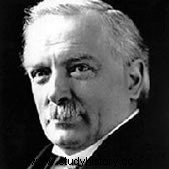David Lloyd George (17 January 1863 in Manchester - 26 March 1945 in Llanystumdwy, Wales), 1st Earl Lloyd George of Dwyfor, was a British statesman. He was the last Prime Minister to belong to the Liberal Party.

Although born in Manchester, Lloyd George comes from a Welsh family. Born to a teaching father who died the following year, he returned to settle in Wales with his mother. He was educated by his mother and his uncle Richard, a shoemaker by trade and a member of the liberal party. Richard, also a Baptist militant, taught him the morals and political ideals of the time as well as French and Latin. After working from the age of fifteen in Liverpool in the offices of a Liberal Party barrister, he successfully studied law (1884) and opened a practice in Criccieth. His difficult youth will push him, throughout his life, to want to improve the lot of the common people at the expense of those he calls "the dukes".
Known as "the poachers' lawyer" following the trial he won, he founded a farmers' union and, in 1887, the newspaper Udgorn Rhyddid (The Trumpets of Freedom) in which he defended the idea of autonomy for Wales. Joining the Liberal Party, he quickly showed his aptitude for politics by being elected, in 1890, Member of Parliament for Caernarfon, in North Wales. In 1905 he joined the new Liberal cabinet of Sir Henry Campbell-Bannerman as President of the Board of Trade and then became Minister of Finance from 1908 to 1915. He introduced old-age pensions and was one of the initiators of what is now called the welfare state which is ultimately rejected by the House of Lords. An Act of 1911 then poses the veto of the Lords as temporary, following this refusal.
Considered a pacifist until 1914, Lloyd George changed position when the First World War broke out and became minister of munitions in 1915, a newly created position, then secretary[1] for war in 1916.
During the war, the Liberals and the Conservatives took part together in the government, led by the Liberal Herbert Asquith. But the conservatives impose its replacement. On December 11, 1916, Lloyd George succeeded him, thus leading to the split of the Liberal Party. He led the country for the rest of the war and represented the United Kingdom at the Versailles peace conference, clashing with both French Prime Minister Georges Clemenceau and United States President Woodrow Wilson.
Lloyd George wants to punish Germany politically and economically but without going as far as Clemenceau would like to destroy its power. When asked afterwards how he got away with it at Versailles, he replies with a witticism:“Not bad considering that I was sitting between Jesus Christ and Napoleon”.
He also defends the idea of a plebiscite to determine the course of the new German-Polish border. The result will be a very long border, militarily indefensible and the scene of many incidents. Until October 20, 1922 he attempted socializing reforms but was largely prevented by his conservative allies. He grants independence to Ireland. He is the last Liberal British Prime Minister.
He was suspected of plotting against Rasputin.
For the next two decades Lloyd George remained on the fringe of politics. One predicts his return which never came. In 1929 he became dean of the chamber, the one who served the longest. In 1931 an illness prevented him from joining the national government. In the 1930s he was sent by the government to Adolf Hitler to try to persuade him not to continue his territorial expansion. He was made a peer of the kingdom in 1945 shortly after his retirement.
